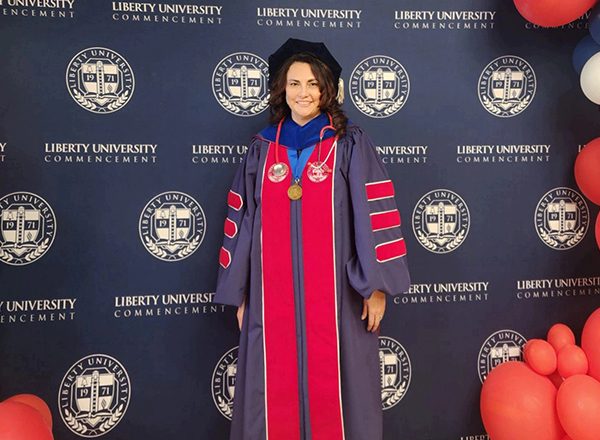From nursing roots to Ph.D. distinction, a Baptist Health South Florida nurse leader chronicles how the system created a culture of resuscitation excellence
In 1997, Claudia Sabogal-Rodriguez, Ph.D., MPHM, MSN, RN, CEN, started her nursing career in Colombia in the emergency department at San Ignacio Hospital. In 2002, she moved to Miami, Fla. and began working in a local hospital’s emergency department. The following year, she arrived at Baptist Health South Florida (BHSF), joining the region’s world-class healthcare organization as a per diem, or contract, employee. Five years later, Sabogal-Rodriguez stepped into a full-time role as an urgent care nurse at BHSF Outpatient Services.
It was in this position where her passion for teaching and educating others became more evident. This also marked the start of her career path embodying the core pillars of BHSF’s mission: teaching, innovation and research [to maintain the highest standards of clinical and service excellence].
“I held a master’s degree in nursing and public health management and a master’s in nursing. In 2008, BHSF Outpatient Services’ leadership approached me about an educator position,” said Sabogal-Rodriguez. “I have always liked to teach and mentor others. This was the ideal opportunity to combine the best practices and learning obtained from both degree disciplines.”
She served as the lead educator in the outpatient services’ urgent care and surgical divisions for five and two years, respectively, followed by BHSF AHA programs coordinator in 2017 and clinical educator for resuscitation and patient care simulation education for two years. She stepped into her current role, manager of resuscitation education, in 2023.
Teaching, check.

Dr. Sabogal-Rodriguez completes her RQI program quarterly training assignment.
As an educator at BHSF, Sabogal-Rodriguez was also charged with identifying and bringing forth new and novel ways to teach and train the system’s clinicians. Enter the Resuscitation Quality Improvement® program.
“The RQI® program first came to my attention in 2015, shortly after the program entered the healthcare market as this new and innovative digital training solution,” Sabogal-Rodriguez recalled. “Unfortunately, the timing was not right for our system to adopt the program, but I believed RQI was a game-changing alternative to the status quo. I kept the door open and the program top-of-mind with system leadership and determined in 2017 that it was time for the RQI program to make its entrance at BHSF.”
Sabogal Rodriguez and her peers proposed an RQI pilot program to BHSF’s leadership council, which led to West Kendall Baptist Hospital earning status as the selected site in July 2018. With two years of tracking nearly 800 clinicians in the pilot “class” and measuring improvement in CPR cognitive and hands-on skills, the system embarked on a systemwide launch during the COVID pandemic — completing implementation across all hospitals in 2021. Today, the system’s 11 hospitals and one outpatient entity have embraced RQI to help its more than 13,000 healthcare providers achieve, sustain and master high-quality resuscitation skills and competence.
“The most rewarding part of working with the RQI program has been seeing the impact on our staff members,” Sabogal-Rodriguez said. “Initially, navigating change management was difficult, as our providers were hesitant about a quarterly program. Eventually, they saw the benefits and realized the improvements they were experiencing in their skills. Their perspective changed completely — they did not have any desire to return to classroom instruction.”
Innovation, check.
Rolling out a new resuscitation training program at the height of the pandemic was a feat within itself. How about adding doctoral studies to an already full plate at BHSF coupled with fulfilling obligations to your family? This was the opportunity before Sabogal-Rodriguez in fall 2020.
“Completing my doctorate was already in the plan; the pandemic just accelerated the timing,” explained Sabogal-Rodriguez. “I’ll admit, working remotely afforded greater flexibility. In May 2024, I graduated from Liberty University with a doctoral degree in philosophy and nursing education.”
Selecting the RQI program as the focal point of her dissertation was an easy decision. Sabogal-Rodriguez wanted to focus her study on what she does every day at BHSF and discovered that research had not been conducted on two aspects: exploring RQI program impact at a system level and measuring the correlation between competence and confidence.
The premise for her dissertation study: Learning does not end when an individual graduates; it is a continuous process. And for real learning to occur, a person needs to solidly possess competence and confidence — hallmarks of the RQI program. Study subjects included RQI program “beginners” who were followed at three, six and nine-month intervals to determine if their level of competence and confidence developed at the same rate.
“We found that learners need the right balance of both competence and confidence to be effective and successful,” said Sabogal-Rodriguez. “For example, in our BHSF environment, if a nurse is lacking confidence, he or she may be hesitant to perform CPR. And on the other hand, if a nurse is displaying ‘over’ confidence, their actions may put a patient at risk. Our research measured cognitive testing and skills for compressions and ventilations and offered proof points that competence and confidence are connected. Especially when more time is spent in the RQI program’s quarterly sessions. Through the data lens, competency scores ranked between 94% and 96% for learners enrolled in a nine-month cycle. The study results highlighted the efficacy of ‘low-dose, high-frequency’ training and gave increased validity to the RQI program’s ability to build learners’ confidence and competence simultaneously.”
Research, check.
With her study, “Effects of Low-Dose, High-Frequency Cardiopulmonary Resuscitation Education on Nurses’ Competency and Confidence,” published in BHSF’s Nursing and Health Sciences Research Journal, Sabogal-Rodriguez shared how she is using the study findings in her current role.
“I am committed and empowered to help bring the best educational resources and learning methodologies to our staff members to continue elevating their resuscitation skills, confidence and competence,” she noted. “I presented my dissertation to our system’s chief nursing officers, with the study results demonstrating that the RQI program introduction in 2018 was a sound investment. This research was a short-term endeavor with only a nursing audience. Next, I would like to test my hypothesis for a longer period with a broader clinician population.”
And as her one-year anniversary of achieving her Ph.D. credential nears, Sabogal-Rodriguez reflects on balancing her professional and personal lives during a global pandemic.
“It is possible to work full time, attend school full time and graduate with high distinction. If you want to, if you put your mind to it, you can.”
To recognize her milestone educational moment, Sabogal-Rodriguez celebrated with her family, mother and sisters in Virginia last May. However, she holds a special trip she took with her son shortly after completing her studies close to her heart — an 11-day spring break excursion to Colombia for mommy-son bonding time.
Congratulations, Dr. Sabogal-Rodriguez!
About Claudia Sabogal-Rodriguez, Ph.D., MPHM, MSN, RN, CEN
Claudia Sabogal-Rodriguez is a board-certified emergency nurse. She received her BSN from the Pontificia Universidad Javeriana and a master’s in public health management from Universidad Del Rosario, a master’s in nursing from University of Phoenix and her Ph.D. in nursing education at Liberty University. She is the manager of resuscitation education at Baptist Health South Florida (BHSF) where she oversees the American Heart Association® certification courses and Resuscitation Quality Improvement® (RQI®) program. Sabogal-Rodriguez also facilitates different education programs, including mock code reviewer courses and competency fairs, and assists with patient simulation. She serves as an American Heart Association national volunteer and is a member of the organization’s Southeast ECC Committee and Education Subcommittee. Sabogal-Rodriguez also serves on the International Liaison Committee on Resuscitation (ILCOR) Diversity and Membership Committee. She has collaborated with RQI Partners on the launch and implementation of the RQI program at BHSF since 2018.









